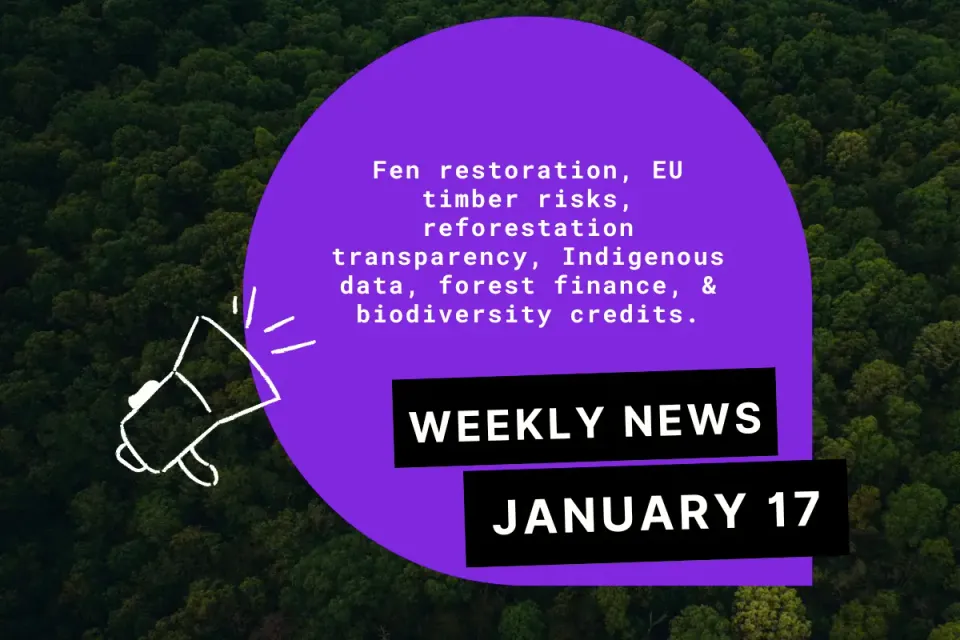Sowing Success: 16 African Entrepreneurs Reviving Land and Growing Profits
Their projects are not just about planting trees or reviving soil — they’re about a movement rooted in resilience, creativity and impact.

This article by Geraldine Wambersie and Jack Seevers was originally published on the World Resources Institute website.
Across Africa, a dynamic wave of entrepreneurs is rewriting the script on land use. Against the backdrop of climate change and deforestation that threatens the health and economy of communities across the continent, these innovators are crafting sustainable solutions that heal the land. Their projects are not just about planting trees or reviving soil — they’re about a movement rooted in resilience, creativity and impact.
In Benin, Kiel Bien-Être is shaking up the traditional fruit business with a fresh approach. The company is building a sustainable value chain around the superfruit of the baobab tree, native to Africa but not yet valued by mainstream financial institutions.
But Kiel Bien-Être is producing more than baobab goods — it is also creating a thriving ecosystem. Working with local women, the business supports families, promotes sustainable farming and transforms the nutritionally dense baobab fruit into everything from snacks to cosmetics. The best part? They use every single part of the baobab, making the business a powerhouse against food waste.
Across the Indian Ocean in Madagascar, Voanala Nahari is on a mission to reforest the island and bring it back to life. It carries out soil and water testing for farmers and collects fruit tree seeds from surrounding communities to sell to companies, government institutions and NGOs that restore land. Drawing on local expertise and relationships, it ensures the sustainability and viability of tree-planting projects for communities.
In Ghana, Envirotech Bamboo Limited is taking a whole new approach to going green. The company grows native bamboo and transforms it into unique bicycle frames and custom cycling products. Through its work, Envirotech sequesters carbon, improves soil health and encourages locals to adopt eco-friendly modes of transport.
Kiel Bien-Être, Voanala Nahari and Envirotech Bamboo Limited are just three of the inspiring companies selected to participate in the 2024 cohort of the Land Accelerator Africa. The program offers businesses the necessary mentorship and training for scaling their ventures and contributes to Africa’s commitment to restore 100 million hectares of land by 2030 through the AFR100 Initiative.
The leaders behind these companies represent a new generation of African entrepreneurs who are developing innovative business solutions at the grassroots level. By incorporating nature into their value chains, they are restoring degraded land and improving local livelihoods all while generating financial returns.
Recognizing that businesses like these are limited by an inability to access investment at scale, WRI has partnered with Fledge, Barka, and AUDA-NEPAD since 2018 to implement the Land Accelerator Africa. This year, the program supports 100 companies across the continent, selected from a pool of 659 applicants. This cohort has gender and social equity at its core: 56% of the companies have a woman co-founder, and 50% are led by young entrepreneurs.
For 12 weeks, they participated in sessions led by seasoned business experts who coached them on leadership, communication and pitching to investors. The entrepreneurs also had the chance to connect with their peers and share lessons from across the African restoration sector. At the end of the program, each participant submitted a pitch deck, website and site visit video, and had the opportunity to apply for the more selective second stage of the Land Accelerator.
The program ultimately selected sixteen standout ventures to come together in Accra, Ghana, to further develop their ideas, refine their pitches and receive training and mentorship from seasoned experts in the restoration sector.
Despite showing the immense potential of for-profit land restoration in Africa, the Top 16 face a formidable set of challenges. Insufficient capital for key investments, and limited access to finance and credit, often stifle their growth. Market volatility, resource constraints and persistent gender bias only add to the pressure. This is where the Land Accelerator steps in, arming these innovative restoration businesses with the tools they need to break through barriers and scale their impact.
Below you can explore the unique stories of these inspiring ventures as they take on the challenge of restoring Africa’s landscapes.
Meet the Land Accelerator Africa’s Top 16 Companies
Africa Farm Research and Development
Sector: Reforestation and agricultural consulting
Location: Benin
By fighting soil degradation and promoting biodiversity through reforestation and agricultural consulting, Africa Farm Research and Development helps local farmers restore their land with high-quality forest and fruit seedlings and sustainable farming techniques. Its mission is to combat soil degradation, enhance biodiversity and strengthen food security through sustainable farming practices. Working with local communities, the company is able to create economic resources while preserving the environment.
Contact: Aimé Roscame Wotto, Agricultural Technician/Planning Officer, roscam007@gmail.com
Acacia Kia (U) Limited
Sector: Sustainable bamboo production
Location: Uganda
Acacia Kia (U) Limited focuses on bamboo multiplication and restoration. It empowers local communities through training and support services, supplying various species of bamboo and emphasizing the importance of proper maintenance of planted areas. Products include bamboo furniture, jewelry and kitchenware, all designed to reduce plastic use in homes.
Contact: Charles Bwambale, Founder/CEO, kiaakacia@gmail.com
Environment and Forestry Enterprise Company Ltd (EFECO)
Sector: Agroforestry, fruit tree seedlings and farmer education
Location: Rwanda
Environment and Forestry Enterprise Company Ltd (EFECO) is a social impact enterprise that drives sustainable environmental practices. Specializing in high-quality tree seedlings for agroforestry and reforestation, EFECO also offers capacity-building programs to smallholder farmers, partnering with them to restore landscapes, promote climate resilience and create green jobs in Rwanda.
Contact: Jean d'Amour Maniriho, Project Manager, mdamour100@gmail.com
Envirotech Bamboo Limited
Sector: Bamboo production and bicycle products
Location: Ghana
Envirotech Bamboo Limited empowers women and youth to design and manufacture innovative electric bamboo bicycles. By using bamboo and indigenous plants, the business promotes ecological restoration, community empowerment and sustainable development. It aims to lead the market in high-quality, sustainable bamboo products that drive eco-friendly innovations.
Contact: Bernice Dapaah, CEO, bernice@envirotechgh.org
Ilkapianga Investment Limited
Sector: Agriculture and forestry
Location: Kenya
Ilkapianga Investment Limited supports sustainable reforestation and combats climate change by supplying indigenous and grafted fruit tree seedlings to restore land and generate income. The company promotes biodiversity and trains local communities in seedling propagation, creating jobs and fostering a circular economy.
Contact: Millicent Lemusa, Founder/CEO, naisiaimlemusa@gmail.com
Inuka SARL
Sector: Waste recycling
Location: Democratic Republic of the Congo
Inuka SARL empowers local communities through ecological and economic initiatives. It transforms waste into products like fertilizer, briquettes, ecological paving stones and leather goods, and also restores degraded land. The company is active in agribusiness and food production with the goal of strengthening local economies and promoting food security.
Contact: Rodrigue Munguwamanya, Sales Director, rodriguelukubugu1@gmail.com
Kiel Bien-Être
Sector: Baobab
Location: Benin
Kiel Bien-Être focuses on three key areas: producing baobab, transforming the fruit into products like snacks and cosmetics and commercializing the tree under the Kiel brand. Operating on a 20-hectare site, the company collaborates with local women to produce and harvest baobab while protecting biodiversity in the area. Committed to sustainability, it repurposes all its byproducts, including organic fertilizers, animal feed, eco-friendly charcoal and biogas production.
Contact: Célia Chabi, Founder/CEO, chabiclua@gmail.com
Kimplanter Seedlings and Nurseries Ltd
Sector: Seedlings and agroforestry
Location: Kenya
Based in the semi-arid region of Kajiado South in Kenya, the youth- and women-led Kimplanter Seedlings and Nurseries Ltd provides affordable, climate-resilient seedlings and training to smallholder farmers. This helps boost productivity and land restoration efforts despite harsh weather conditions, and ultimately works to protect the farmers’ livelihoods.
Contact: Carolyne Mwangi, CEO, carolyne@kimplanterseedlings.co.ke
Motso Honey Company
Sector: Honey and beekeeping
Location: Zimbabwe
Motso Honey Company advocates for sustainable beekeeping practices that improve livelihoods, preserve agricultural traditions, combat biodiversity loss and reduce greenhouse gas emissions. The company also offers beekeeping supplies, training, hive management, honey production, bee tourism, pollination services and a range of bee-related products.
Contact: Edson Mangwende, CEO, info@motsohoney.co.zw
Ndugunamiti Enterprises Ltd
Sector: Nurseries and sustainable timber
Location: Tanzania
Ndugunamiti Enterprises Ltd promotes tree planting for landscape restoration and advocates for climate smart agriculture, agroforestry and conservation practices for small scale farmers in the Mwanza region. The company champions responsible forest management for timber and wood processing, envisioning prosperity for both local communities and the planet. Relying on government forest services for crucial technical expertise, it mobilizes community members to nurture and protect the seedlings in their nurseries and encourages farmers to plant indigenous and threatened species.
Contact: Mayenga Shija, Managing Director, ndugunamiti2012@gmail.com
Ngeli Foods
Sector: Honey and beekeeping
Location: Kenya
Ngeli Foods specializes in producing, processing and distributing bee products. It collaborates with beekeepers by providing training and offering resources to help them become more sustainable, emphasizing the use of data analytics to track their progress towards zero-waste and carbon neutrality targets. The company also aggregates and processes multi-flora and naturally flavored honey, propolis and beeswax, taking pride in offering consumers top-notch raw Kenyan honey and spreading the word about the importance of bees.
Contact: Stanley Somba, CEO, ngeli@ngelifoods.com
Société Congolaise d'Innovation et Transformation (SCITRA)
Sector: Charcoal
Location: Democratic Republic of the Congo
The Congolese Society for Innovation and Transformation, known as SCITRA in French, is committed to environmental protection and sustainable development. It transforms waste into eco-friendly products, such as organic fertilizers and eco-charcoal, and since 2017, it has also planted trees on over 20 hectares of land. In 2024, the venture launched the production of SCITRA GORILLA biomass stoves, promoting clean and sustainable energy to fight climate change and help improve local livelihoods.
Contact: Joseph Kibange Mihali, Managing Director, kibangejoseph@gmail.com
Springboard
Sector: Chocolate, plantain chips and protein bread
Location: Nigeria
Using a cooperative model, Springboard empowers thousands of small-scale farmers and rural women to sustainably grow organic cacao, plantains and edible crickets. The company uses a hub-and-spoke collection system to buy quality produce at reasonable prices, ensuring farmers receive fair trade premiums and earn significant margins. The cooperative supplies over 500,000 tree seedlings to farmers every year and produces protein bread made from edible crickets, the first of its kind to be approved by Nigeria’s National Agency for Food and Drug Administration and Control (NAFDAC).
Contact: Lawrence Afere, Founder, lawrence@springboardnig.com
Trapro
Sector: Agritech and sustainable agriculture
Location: Rwanda
Trapro provides affordable, personalized and environmentally friendly farming services to small- and medium-scale farmers. It focuses on cash crops like coffee to drive sustainable farming practices, and supports farmers by offering access to essential inputs, market linkages, microloans and technical training on best agricultural practices. By providing seeds, financing options and resources to farmers, Trapro empowers them to grow more food for themselves and their communities.
Contact: Jean Pierre Niyigena, Chief Operations Officer, jeanpierre.niyigena1@gmail.com
Voanala Nahari
Sector: Reforestation
Location: Madagascar
Voanala Nahari provides reforestation consulting services, offering studies on soil structure and water availability, selecting appropriate trees for planting, selling seedlings and seeds, and monitoring clients' plantations to ensure the trees are surviving long-term. Voanala Nahari specializes in indigenous seedling propagation, shaping Madagascar’s restoration economy by protecting native tree species.
Contact: Soanorovelo Raharifiantra, CEO, voanalanahary@gmail.com
Yatta Beekeepers Limited
Sector: Honey and beekeeping
Location: Kenya
Yatta Beekeepers Limited combines beekeeping with agroforestry to support both farmers and forests in East Africa. This youth-led company empowers smallholder farmers with training, extension services and market access. By sharing effective beehive management techniques, Yatta Beekeepers is helping to protect local biodiversity and safeguard the native bee population.
Contact: Joan Kinyanjui, Co-Founder, yattabeekeepers@gmail.com
License
Sowing Success: 16 African Entrepreneurs Reviving Land and Growing Profits
By Geraldine Wambersie and Jack Seevers, October 10, 2024
Originally published on the World Resources Institute (WRI) blog.
Content licensed under a Creative Commons Attribution License. This version uses different images from the original article.
© 2024 World Resources Institute.




